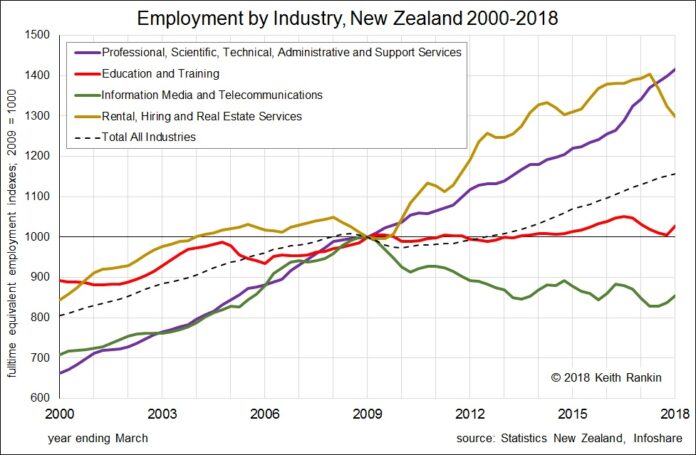Chart and Analysis by Keith Rankin:
Remember the ‘knowledge economy’. It was a buzz-expression around 20 years ago. The impression was that the leading growth sectors would be in education, information, and communication. So, what has happened?
The chart converts employment numbers (fulltime equivalent jobs, where part-time jobs are counted as half a job) into indexes with a base of 1000 set at the year to March 2009 (the year of the Global Financial Crisis – GFC).
Prior to 2009, the growth sectors were ‘Information Media and Telecommunications’ and the assortment called ‘Professional, Scientific, Technical, Administrative and Support Services’. ‘Education’ and ‘Real Estate’ were slower growing sectors despite obvious boosts to the demand for these services in the 2000s’ decade.
After the GFC, the sector dominated by real estate (‘Rental, Hiring and Real Estate Services’) grew sharply, until the last 12 months when it dropped off markedly. Few surprises, except that the same thing did not also happen from 2003 to 2008.
The big employment stories this decade are the dramatic retrenchment of the 2000s’ darling ‘Information Media and Telecommunications’. And the flatlining of the education sector.
To understand what has been happening – rather than what has not been happening – we need to unpack the ‘Professional …’ hodgepodge. This assortment of services now represents 15% of all employee jobs, up from 10% in 2000.
Basically, this industry sector is ‘non-financial business services’, though there are many services to businesses in the other sectors as well. (The chart only shows 4 of 16 employment sectors.) The keywords are: ‘design’, ‘legal’, ‘accounting’, ‘marketing’, ‘management’ and ‘consulting’ services. These are sometime called ‘transaction services’, which represent ‘transaction costs’; ie the outsourced costs of other businesses doing business. We note that these services are not growing as a direct response to increased desire by consumers for these activities. Increased productivity in these sub-sectors should mean them releasing workers into other parts of the economy.
Another way of characterising these services is as ‘problem-resolving’ services. That means the increased demand for them is generated by an increased incidence of problems faced by businesses in other sectors. It also suggests that these are sub-sectors that grow as a result of their own failure; and that growth here follows from the persuasiveness of these professionals in convincing other businesses to purchase more of their professional services.
If meaningful economic growth represents the removals of obstacles (problems, barriers) that absorb too many of our resources, then this kind of employment should decline as these problems are solved, while employment in high level consumer services (which include media and liberal education) should be expanding in line with those services capacities to satisfy the higher levels of Maslow’s ‘hierarchy of needs’ (see Youtube explanation).
Why is employment in education increasing so slowly compared to employment growth generally? Why do we need 100 percent more transaction service professionals in 2018 compared to 2000, but only 15 percent more teachers? These business service professionals are very much embedded in the marketplace, yet no orthodox economic theory can explain the dramatic increase in our purchases of their services.
——
Lists of industries within the broad sectoral categories:
Professional, Scientific, Technical, Administrative and Support Services
- architectural services
- surveying and mapping services
- gardening services
- engineering design and consulting services
- computer system design and related services
- other specialised design services
- scientific research services
- scientific testing and analysis services
- veterinary services
- professional photographic services
- legal services
- accounting services
- advertising services
- market research and statistical services
- corporate head office management services
- management advice and related consulting services
- travel agency services
- employment services
- other administrative services
- building and other industrial cleaning services
- building pest control services
- packaging and labelling services
Information Media and Telecommunications
- newspaper publishing
- newspaper, periodical, book and directory publishing
- software publishing
- motion picture and video activities
- sound recording and music publishing
- radio broadcasting
- television broadcasting
- internet publishing and broadcasting
- telecommunications services
- internet service providers and web search portals
- data processing and web hosting services
- electronic information storage services
- libraries and archives
- other information services
Rental, Hiring and Real Estate Services
- real estate services
- property operators
- non-financial intangible assets (except copyrights) leasing
- video and other electronic media rental and hiring
- farm animal and bloodstock leasing
- motor vehicle and transport equipment rental and hiring
- other goods and equipment rental and hiring
Education and Training
- preschool education
- school education
- tertiary education
- adult, community and other education
- educational support services.





